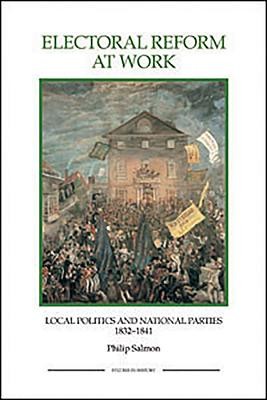
- We will send in 10–14 business days.
- Author: Philip Salmon
- Publisher: Boydell Press
- ISBN-10: 1843836424
- ISBN-13: 9781843836421
- Format: 15.6 x 23.4 x 1.7 cm, softcover
- Language: English
- SAVE -10% with code: EXTRA
Reviews
Description
The Reform Act of 1832 is shown to have politicised the electorate at all levels, laying the constitutional foundations for the representative democracy of the Victorians.
This book charts the political transformation of Britain that resulted from the "Great" Reform Act of 1832. It argues that this extensively debated parliamentary reform, aided by the workings of the New Poor Law (1834) and Municipal Corporations Act (1835), moved the nation far closer to a "modern" type of representative system than has previously been supposed. Drawing on hitherto neglected local archives and the records of election solicitors, Dr Salmondemonstrates how the Reform Act's practical details, far from being mere "small print", had a profound impact on borough and county politics. Combining computer-assisted electoral analysis with traditional methods, he traces the emergence of new types of voter partisanship and party organisation after 1832, and exposes key differences between the parties which resulted in a remarkable national recovery by the Conservative party. In passing he provides important new perspectives on issues such as MPs' relations with their constituents, the expense and culture of popular politics after 1832, the electoral impact of railway development, and the role of "deference voting" in the counties. Dr PHILIP SALMON is Editor of the 1832-1945 House of Commons project at the History of ParliamentEXTRA 10 % discount with code: EXTRA
The promotion ends in 19d.09:59:50
The discount code is valid when purchasing from 10 €. Discounts do not stack.
- Author: Philip Salmon
- Publisher: Boydell Press
- ISBN-10: 1843836424
- ISBN-13: 9781843836421
- Format: 15.6 x 23.4 x 1.7 cm, softcover
- Language: English English
The Reform Act of 1832 is shown to have politicised the electorate at all levels, laying the constitutional foundations for the representative democracy of the Victorians.
This book charts the political transformation of Britain that resulted from the "Great" Reform Act of 1832. It argues that this extensively debated parliamentary reform, aided by the workings of the New Poor Law (1834) and Municipal Corporations Act (1835), moved the nation far closer to a "modern" type of representative system than has previously been supposed. Drawing on hitherto neglected local archives and the records of election solicitors, Dr Salmondemonstrates how the Reform Act's practical details, far from being mere "small print", had a profound impact on borough and county politics. Combining computer-assisted electoral analysis with traditional methods, he traces the emergence of new types of voter partisanship and party organisation after 1832, and exposes key differences between the parties which resulted in a remarkable national recovery by the Conservative party. In passing he provides important new perspectives on issues such as MPs' relations with their constituents, the expense and culture of popular politics after 1832, the electoral impact of railway development, and the role of "deference voting" in the counties. Dr PHILIP SALMON is Editor of the 1832-1945 House of Commons project at the History of Parliament

Reviews